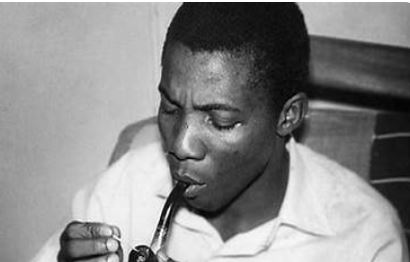
By Uzor Maxim Uzoatu
Writing on what passes for Nigerian politics today is a pathetic attempt at making meaning out of wretched absurdity.
To lift the spirit, one has to take a recourse to literature where there is a measure of elevation in the undertaking of Nigeria’s creative writers across the decades.
One cannot be too wrong in starting the discourse with the offering of Nigeria’s arguably most influential poet, Christopher Okigbo.
The lived life of Okigbo was short, but the poetry he wrote remains deathless.
It is remarkable that Nigeria’s US-based academic, poet and journalist Professor wrote a full-length biography of the most anthologized modern African poet entitled Christopher Okigbo (1930-67) – Thirsting for Sunlight published in the United Kingdom by James Currey in 2017.
Christopher Okigbo died in 1967 fighting for the independence of Biafra, but his power lingers on.
According to the poet Odia Ofeimun, author of The Poet Lied, Okigbo gave a knock on the head of every modern-day Nigerian poet.
What strikes one as being quite controversial after reading Obi Nwakanma’s Christopher Okigbo (1930-67) – Thirsting for Sunlight is the giving of the year of birth of Okigbo as 1930 as opposed to 1932 that had long been depicted in the poet’s collections and anthologies.
Be that as it may, Obi Nwakanma chronologically traces the mystique of Okigbo back to his Igbo roots in his hometown of Ojoto in present-day Anambra State where he grew up enamoured of the water goddess Idoto.
Having tragically lost his mother early in life, Okigbo thrived under the tutelage of his headmaster father before gaining admission into the prestigious Government College, Umuahia.
The young Okigbo was prodigious in educational uplift and sports from the end of the Second World War in 1945 to 1950.
As a classics scholar in University College, Ibadan (UCI), Okigbo spent more time playing cricket, politics and music on the clarinet.
Upon graduation, his employment as a colonial civil servant ended on a scandalous note, while his dabbling into business fetched him bankruptcy.
Okigbo found his niche in poetry when his UCI mate, Alex Olu Ajayi, who was serving as the Principal of Fiditi Grammar School employed him as the Vice-Principal from 1958 to Nigeria’s Independence year of 1960.
From 1960 to 1962 Okigbo served as the Assistant Librarian of the University of Nigeria, Nsukka, where he thrived as a ravenous romancer of women and poetry in equal measure.
When Okigbo became the West African Regional Manager of Cambridge University Press in Ibadan in 1962, he arrived at the epicentre of the Nigerian literary spring as showcased by the Mbari Club with the dramatist Wole Soyinka, the poet John Pepper Clark, and the novelist Chinua Achebe coming in from Lagos.
The tragedy of Nigeria upped a notch with the January 15, 1966 military coup of which his friend Emmanuel Ifeajuna was the leader.
Okigbo helped Ifeajuna to escape from Nigeria after the coup failed, and he undertook to bring his coup-plotter friend back from Ghana.
The July 29, 1966 revenge coup of the Northern military officers and the concomitant genocide meted out to his fellow Igbo people traumatized Okigbo such that he vowed to join the military to defend his homeland that had adopted the name Biafra.
He took to running arms in aid of the Biafra war effort, and was killed in battle in his beloved Nsukka.
The London Sunday Times then described Christopher Okigbo’s death in September 1967 as “the single most important tragedy of the Nigerian civil war.”
As a way of summing the mourned poet’s life after his death, Obi Nwakanma wrote: That was Christopher Okigbo – a great mythmaker – whose life symbolized one man’s constant attempt at experiencing life as poet, civil servant, businessman, school teacher, librarian, soldier, classic scholar, arms runner, cricketer, epicurean and, above all, as Idoto’s reconciled prodigal. With his death, the poet became one of the most fascinating figures in the history of modern African literature.”
The Kenyan scholar, Prof Ali Mazrui, put pen to his annoyance over Okigbo’s choice of death via defending his tribe instead of his art by publishing the novel The Trial of Christopher Okigbo.
Also chipping in on Okigbo’s death, the novelist Nkem Nwankwo, author of Danda and My Mercedes Is Bigger Than Yours, wrote: “…in some unmarked grave in the Nsukka bush, the world’s worst employee, worst husband and father, finally redeemed himself, was translated, like Palinurus, to immortality.”
Christopher Okigbo forever deserves celebration as one of the greatest cult figures in world literature.
The post There Was A Poet Called Christopher Okigbo appeared first on Vanguard News.








